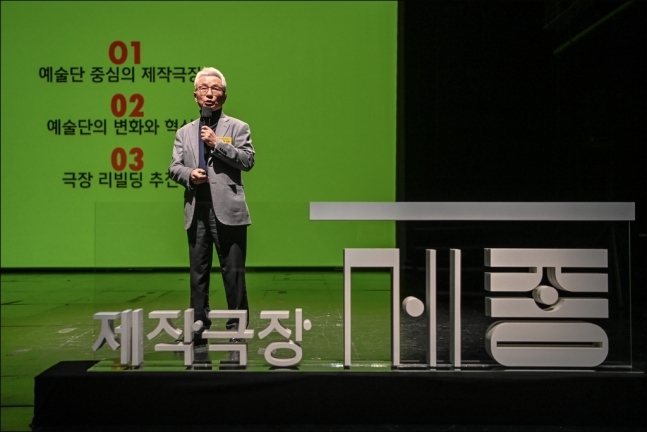Facing myriad challenges, Sejong Center unveils renovation plan
By Park Ga-youngPublished : Feb. 22, 2022 - 17:48

Sejong Center for the Performing Arts unveiled Monday a series of plans to revitalize the ageng cultural complex that is facing competition from newer facilities as well as financial difficulties.
Ahn Ho-sang, who took the helm of the center in October, said that the Sejong Center faced competition not just from other performance facilities but also digital content platforms such as Nexflix. Ahn, a former CEO of the National Theater of Korea, said it was therefore “inevitable that center be transformed into a production-focused theater.”
Sejong Center, which has nine performing arts companies under its wing, will create more original works, which in the past failed to attract crowds.
“It wasn’t an easy decision because resident art groups’ performances made up only 12 percent of the total audience, despite 42 percent of the budget and manpower being allocated to the art groups. Still, I think this is the best path to take,“ Ahn said.
Sejong Center has Seoul Metropolitan Traditional Music Orchestra, Seoul Metropolitan Dance Theatre, Seoul Metropolitan Chorus, Seoul Metropolitan Musical Theater, Seoul Metropolitan Theater, Seoul Metropolitan Opera, Seoul Youth Orchestra and Seoul Junior Chorus and Seoul Metropolitan Youth Traditional Music Ensemble under its umbrella.
The change in focus is reflected in this year’s programming. For its spring season, from March 26 to June 26, there will be 61 performances of nine works, of which eight are produced by the resident companies.
Sejong Center’s theater rental business is likely to face more competition in future as specialized venues for different performance genres, including musical theater, are under construction across Seoul.
The revitalization plan for Sejong Center, which has several performance halls, galleries and a convention center, also includes an extensive renovation of the facility, which was built in 1978, to accommodate the needs of the resident art troupes. The 3,000-seat main hall will have fewer seats after the renovation. Other smaller halls include M Theater with 609 seats, box-type S Theater with about 300 seats and Sejong Chamber Hall with 443 seats.
While the exterior of the building is likely to be kept intact as the building is designated as Seoul’s Future Heritage by the Seoul Metropolitan Government, which provides 60 percent of Sejong Center’s annual budget, the upcoming renovation will be designed to meet the new needs and opportunities created by the opening of the new Gwanghwamun Square slated for the second half of this year.
Renovation is likely to commence in 2024 and be completed by 2028 if everything goes smoothly, Ahn said.
Ahn Ho-sang, who took the helm of the center in October, said that the Sejong Center faced competition not just from other performance facilities but also digital content platforms such as Nexflix. Ahn, a former CEO of the National Theater of Korea, said it was therefore “inevitable that center be transformed into a production-focused theater.”
Sejong Center, which has nine performing arts companies under its wing, will create more original works, which in the past failed to attract crowds.
“It wasn’t an easy decision because resident art groups’ performances made up only 12 percent of the total audience, despite 42 percent of the budget and manpower being allocated to the art groups. Still, I think this is the best path to take,“ Ahn said.
Sejong Center has Seoul Metropolitan Traditional Music Orchestra, Seoul Metropolitan Dance Theatre, Seoul Metropolitan Chorus, Seoul Metropolitan Musical Theater, Seoul Metropolitan Theater, Seoul Metropolitan Opera, Seoul Youth Orchestra and Seoul Junior Chorus and Seoul Metropolitan Youth Traditional Music Ensemble under its umbrella.
The change in focus is reflected in this year’s programming. For its spring season, from March 26 to June 26, there will be 61 performances of nine works, of which eight are produced by the resident companies.
Sejong Center’s theater rental business is likely to face more competition in future as specialized venues for different performance genres, including musical theater, are under construction across Seoul.
The revitalization plan for Sejong Center, which has several performance halls, galleries and a convention center, also includes an extensive renovation of the facility, which was built in 1978, to accommodate the needs of the resident art troupes. The 3,000-seat main hall will have fewer seats after the renovation. Other smaller halls include M Theater with 609 seats, box-type S Theater with about 300 seats and Sejong Chamber Hall with 443 seats.
While the exterior of the building is likely to be kept intact as the building is designated as Seoul’s Future Heritage by the Seoul Metropolitan Government, which provides 60 percent of Sejong Center’s annual budget, the upcoming renovation will be designed to meet the new needs and opportunities created by the opening of the new Gwanghwamun Square slated for the second half of this year.
Renovation is likely to commence in 2024 and be completed by 2028 if everything goes smoothly, Ahn said.











![[Today’s K-pop] BTS pop-up event to come to Seoul](http://res.heraldm.com/phpwas/restmb_idxmake.php?idx=644&simg=/content/image/2024/04/17/20240417050734_0.jpg&u=)





![[KH Explains] Hyundai's full hybrid edge to pay off amid slow transition to pure EVs](http://res.heraldm.com/phpwas/restmb_idxmake.php?idx=652&simg=/content/image/2024/04/18/20240418050645_0.jpg&u=20240418181020)

![[Today’s K-pop] Zico drops snippet of collaboration with Jennie](http://res.heraldm.com/phpwas/restmb_idxmake.php?idx=642&simg=/content/image/2024/04/18/20240418050702_0.jpg&u=)